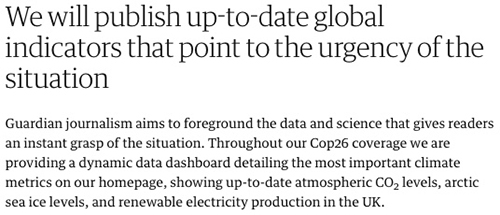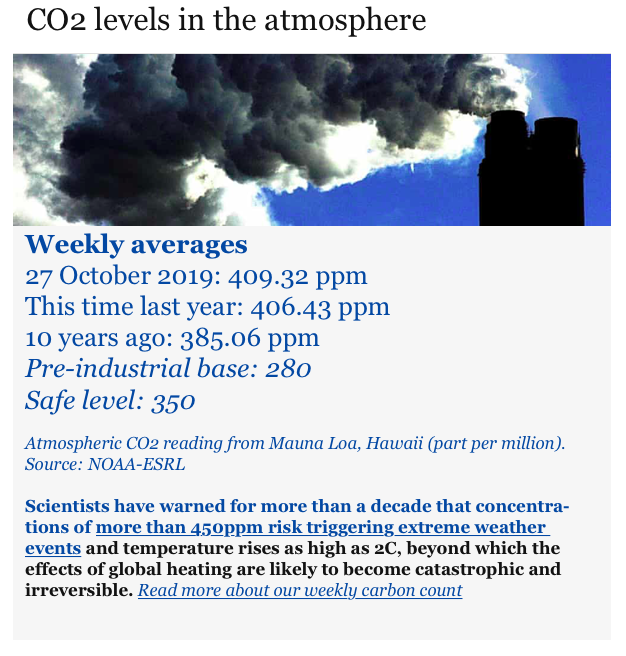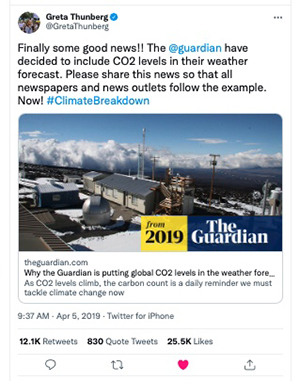
A climate and CO2 reporting story about and by The Guardian
The Guardian newspaper is widely recognized as a leader for its pledge and journalistic actions to keep readers informed on the climate emergency, atmospheric CO2 levels and how these issues are connected to social, economic and environmental issues of the day.
In the words of Katharine Viner in The Guardian's climate promise of October 5, 2020:
"The global climate crisis is the emergency of our times. Amid all the fear and sadness of 2020, it remains the overwhelming long-term threat to our planet and to everyone’s health and security. That is why we promise to keep reporting on it, raising the alarm and investigating the crisis and possible solutions, until we begin to see genuine systemic change."
The Guardian is not the only media outlet which is leading in the important, ongoing work to connect these important issues. But for a few reasons, the newspaper has earned its place in the spotlight. The Guardian publishes its policies, practices and goals for readers and other media organizations. It measures and reports on its progress. And it's readership and influence are international in scope.
But not everyone has been following The Guardian's reporting on climate, tracking of CO2 and disclosure of its journalism practice and progress. For those who have not, we compiled examples and links to notable articles on this one page.
Here, we introduce The Guardian's story. Rather than write about their story from outside the newspaper, you are invited to explore the chronological collection of links below to the parts of the story which The Guardian wrote as it developed.
We do not know of another collection which makes as many key articles accessible together in one place. In any case, we believe it is a story worth exploring by anyone with a serious interest in climate media reporting, climate journalism or journalism more generally.
Our comment on the "foregrounding" of CO2 levels
There is one thing to add before we let the links to The Guardian's articles tell the story we are acknowledging and introducing: Do not overlook the small but vital realization by The Guardian that it could not meet its climate reporting pledges without publishing regular measurements of CO2 levels in the Earth's atmosphere.
Excerpt from The Guardian's Climate Pledge article, Oct 25 2021:

Worldwide, newspaper readers understand the year-over-year comparisons of CO2 measurements which are taken directly from air in our planet's atmosphere. Regular reporting of atmospheric CO2 levels allow people to see the global trend in real-time without reporting delays or need for much institutional interpretation. It gives the people of the world an objective, leading signal for the direction, level and speed of global environmental changes and their resulting cascade of impacts. It grounds the public stories and discourse about climate changes, targets and actions. It helps members of the public hold national, corporate and community leaders to account for matching and overtaking the crisis at the scale and speed it is travelling.
We think The Guardian is correct to assume that climate reporting without the latest CO2 numbers is not enough to meet its pledge to deliver environmental reporting "in service of the planet." People need to get the signals and information directly from the Earth itself. Generally, media outlets have not been doing delivering the Earth's information. But The Guardian has started in the UK. CBC Radio One, CHEX Global News and The Peterborough Examiner have started in Canada. And DCTV started in Colorado, USA.
To repeat a 2019 tweet by Greta Thunberg:
"Please share this news so that all newspapers and news outlets follow the example. Now!"
Is it enough for the media to report on global environmental change and responses to the global climate emergency without regular updates of the Earth's most important signal? We think not. They are inseparable.
Sample CO2 tracking in The Guardian
The Guardian May 2021 (weather page) MLO CO2 for May 18 2019 plus 3 annual comparisons for week of May 9-15, 2021
The Guardian Nov 2019 (email excerpt to digital subscribers) MLO CO2 levels for week of Oct 27-Nov 2, 2019
The Guardian May 2019 (weather page) MLO CO2 for May 20 2019 plus 3 annual comparisons for week of May 12-18, 2019

Why The Guardian publishes CO2 levels every day
The Guardian Dec 14 2018 The letter to the Guardian that sparked its CO2 reports (see comment by Daniel Scharf)
The Guardian Apr 5 2019 Why the Guardian is putting global CO2 levels in the paper every day
The Guardian May 17 2019 Why the Guardian is changing the language it uses about the environment
The Guardian Oct 15 2019 Environmental pledge 2019
The Guardian Oct 16 2019 It's a crisis not a change: 6 Guaridan language changes on climate matters
The Guardian Oct 31 2019 Guardian environment writers
The Guardian Oct 5 2020 The Guardian's climate promise: We will keep raising the alarm
The Guardian Oct 25 2021 The Guardian's climate pledge

A call to action for the media
"The Guardian...decided to include CO2 levels in their weather forecast. Please share this news so that all newspapers and news outlets follow the example. Now!"
~ Greta Thunberg (Apr 5 2019 @gretathunberg)

General links for The Guardian
The Guardian International edition online
The Guardian Environment section
The Guardian Climate change section
Facebook @theguardian
Twitter @guardian
CO2 for print
Show.Earth CO2 for newspaper readers
Show.Earth CO2 for newspaper editors
